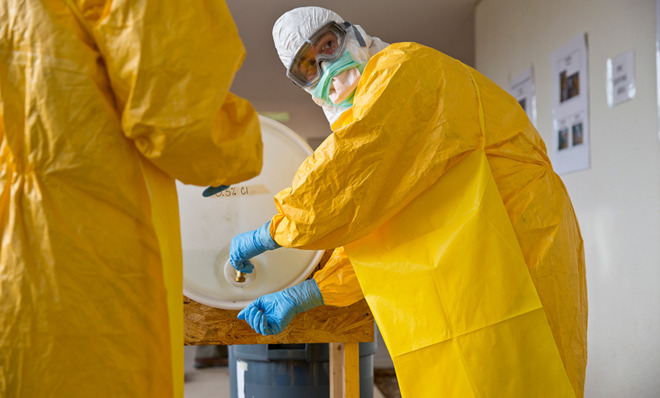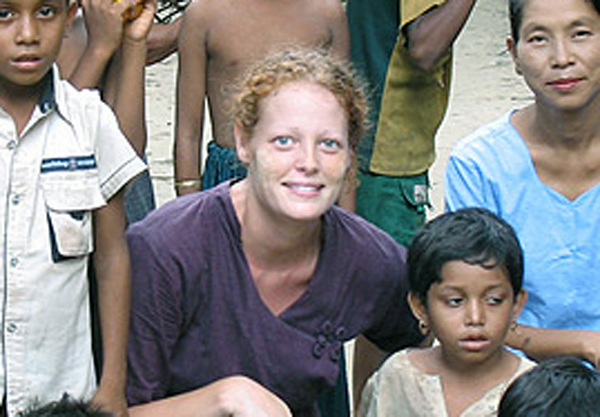The Obama administration's confused, contradictory Ebola response
One part of the administration has criticized quarantines while another has imposed them. What gives?


A free daily email with the biggest news stories of the day – and the best features from TheWeek.com
You are now subscribed
Your newsletter sign-up was successful
The Obama administration's confused and erratic handling of Ebola created a singularly strange moment this week, when one part of the government was for quarantines, one was against them, and many of us were left wondering what the heck was going on.
It all started after Dr. Craig Spencer, returning to New York City from West Africa, failed to self-isolate while still in the incubation period for the deadly hemorrhagic fever. Amid public worry, the governors of New York and New Jersey imposed a quarantine requirement for anyone arriving in their airports from Ebola-impacted countries, including doctors and nurses returning from missions to combat the disease.
The White House immediately began pushing back against both Democrat Andrew Cuomo and Republican Chris Christie, arguing that the demand to quarantine healthy people who provided assistance was both unreasonable and unnecessary. Press Secretary Josh Earnest emphasized the heroic nature of nurse Kaci Hickox, who became the first person to have the mandatory quarantine applied when she returned from West Africa. "Somebody like Kaci Hickox who is making a commitment to volunteer her time and travel to West Africa," Earnest told reporters at the daily press briefing yesterday, delivered a "service that is deserving of praise and respect, and having her sit in a tent for two or three days doesn't exactly do that."
The Week
Escape your echo chamber. Get the facts behind the news, plus analysis from multiple perspectives.

Sign up for The Week's Free Newsletters
From our morning news briefing to a weekly Good News Newsletter, get the best of The Week delivered directly to your inbox.
From our morning news briefing to a weekly Good News Newsletter, get the best of The Week delivered directly to your inbox.

The CDC and the National Institutes of Health initially opposed any quarantine policies and travel bans. CDC director Tom Frieden insisted that a travel ban would "backfire" by making it harder to fight Ebola in Africa. NIH director Anthony Fauci called the decision by Cuomo and Christie "a little bit draconian" and suggested that it was disrespectful to isolate health-care workers after their service in Africa. "We need to treat them, returning people, with respect," Fauci told NBC's Chuck Todd. "If someone comes back from wherever, Liberia, and they're well, they are no danger to anyone. That is for sure."
Or perhaps not. Not long after Hickox got released from her New Jersey quarantine for a home-based isolation in Maine, the Pentagon decided that its own heroes operating in Ebola-impacted nations would require a 21-day quarantine after their last contact with patients. It started with an imposed quarantine at the U.S. base in Vicenza, Italy, where even Major General Darryl Williams got ordered to remain in isolation. That cuts against the previously announced Department of Defense policy on containment, which stipulated, "as long as individuals remain asymptomatic, they may return to work and routine daily activities with family members."
As CNN reports, this new policy may not be all that new. On October 10, long before Cuomo and Christie took action in the aftermath of the New York City case, Undersecretary of Defense Jessica Wright outlined in a memo the plans for quarantining troops sent to fight Ebola on their exit from Africa. Those who had contact with Ebola patients, just as Hickox and Spencer did, would face a mandatory 21-day quarantine. Those who had traveled to the region but had no confirmed contact with Ebola patients would be required to undergo monitoring.
The Pentagon may go even further. The Joint Chiefs have recommended that all returning service members in all branches observe a 21-day quarantine. When pressed, Earnest told reporters that Defense Secretary Chuck Hagel may end up coordinating with the White House on whether to adopt that recommendation, but refused to divulge President Obama's position. "We will let the Department of Defense make an announcement," Earnest said.
A free daily email with the biggest news stories of the day – and the best features from TheWeek.com
The CDC ended up retreating late yesterday after the Obama administration pushback against quarantine policies. Frieden proposed a "do not board" list for high-risk personnel, keeping them from commercial air travel during the 21 days after their last exposure to Ebola. They did not go as far as the Pentagon in supporting quarantines, but instead called for voluntary self-isolation for those who may have had inadequate protective equipment while treating Ebola patients, or had an accidental needle stick during that period. Those at high risk would still be able to leave their homes, but would be discouraged from attending "congregate gatherings" like sporting events — presumably including bowling and restaurants, as Spencer did while experiencing "fatigue" prior to developing a fever.
This whole contradictory mess deepens the impression that the White House is making things up as it goes along. Within the last few days, one part of the Obama administration has criticized quarantines while another has imposed them, and the CDC has performed so poorly that public confidence in their competence has eroded. President Obama had appointed a former political aide to Joe Biden as his "Ebola czar," but no one has heard anything from Ron Klain. Indeed, the administration's responses have become more chaotic after that appointment rather than better organized.
Obama initially dismissed the danger of Ebola patients coming to the U.S. as "unlikely," and then insisted that the CDC and the White House were prepared for the low-percentage chance it might. Obama made the right call on sending U.S. forces to fight Ebola in Africa, but clearly failed to articulate a strategy for those forces when they returned — almost literally having no exit plan. The appointment of Klain had nothing to do with science and everything to do with politics, and has had no impact whatsoever on the disorganization and contradictory messages coming from the federal government.
In that environment, it makes perfect sense for governors and military leaders to fill the leadership vacuum left by the White House. Cuomo responded to criticism of the quarantine policy by admitting he might be overcautious, but "I would rather be, in this situation, a little overcautious. And," he added, "I think all New Yorkers feel the same."
After having a health-care professional bring the virus to America's most populous city, they probably do. And they would probably like to see more caution and actual disease control rather than happy talk about how difficult it is for people to get Ebola while two cases have now come from overseas, and two others from a health-care system that the CDC and the Obama administration assured Americans two months ago was ready to handle the virus. This track record on Ebola leaves no room for the benefit of the doubt any longer.
Edward Morrissey has been writing about politics since 2003 in his blog, Captain's Quarters, and now writes for HotAir.com. His columns have appeared in the Washington Post, the New York Post, The New York Sun, the Washington Times, and other newspapers. Morrissey has a daily Internet talk show on politics and culture at Hot Air. Since 2004, Morrissey has had a weekend talk radio show in the Minneapolis/St. Paul area and often fills in as a guest on Salem Radio Network's nationally-syndicated shows. He lives in the Twin Cities area of Minnesota with his wife, son and daughter-in-law, and his two granddaughters. Morrissey's new book, GOING RED, will be published by Crown Forum on April 5, 2016.
-
 Why is the Trump administration talking about ‘Western civilization’?
Why is the Trump administration talking about ‘Western civilization’?Talking Points Rubio says Europe, US bonded by religion and ancestry
-
 Quentin Deranque: a student’s death energizes the French far right
Quentin Deranque: a student’s death energizes the French far rightIN THE SPOTLIGHT Reactions to the violent killing of an ultraconservative activist offer a glimpse at the culture wars roiling France ahead of next year’s elections
-
 Secured vs. unsecured loans: how do they differ and which is better?
Secured vs. unsecured loans: how do they differ and which is better?the explainer They are distinguished by the level of risk and the inclusion of collateral
-
 The billionaires’ wealth tax: a catastrophe for California?
The billionaires’ wealth tax: a catastrophe for California?Talking Point Peter Thiel and Larry Page preparing to change state residency
-
 Bari Weiss’ ‘60 Minutes’ scandal is about more than one report
Bari Weiss’ ‘60 Minutes’ scandal is about more than one reportIN THE SPOTLIGHT By blocking an approved segment on a controversial prison holding US deportees in El Salvador, the editor-in-chief of CBS News has become the main story
-
 Has Zohran Mamdani shown the Democrats how to win again?
Has Zohran Mamdani shown the Democrats how to win again?Today’s Big Question New York City mayoral election touted as victory for left-wing populists but moderate centrist wins elsewhere present more complex path for Democratic Party
-
 Millions turn out for anti-Trump ‘No Kings’ rallies
Millions turn out for anti-Trump ‘No Kings’ ralliesSpeed Read An estimated 7 million people participated, 2 million more than at the first ‘No Kings’ protest in June
-
 Ghislaine Maxwell: angling for a Trump pardon
Ghislaine Maxwell: angling for a Trump pardonTalking Point Convicted sex trafficker's testimony could shed new light on president's links to Jeffrey Epstein
-
 The last words and final moments of 40 presidents
The last words and final moments of 40 presidentsThe Explainer Some are eloquent quotes worthy of the holders of the highest office in the nation, and others... aren't
-
 The JFK files: the truth at last?
The JFK files: the truth at last?In The Spotlight More than 64,000 previously classified documents relating the 1963 assassination of John F. Kennedy have been released by the Trump administration
-
 'Seriously, not literally': how should the world take Donald Trump?
'Seriously, not literally': how should the world take Donald Trump?Today's big question White House rhetoric and reality look likely to become increasingly blurred
